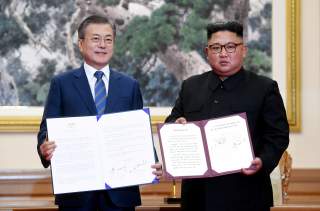North Korea and America’s Second Summit: Here’s What Stephen Noerper Thinks Will Happen
"This will 'begin' a process of denuclearization, but the devil remains in the details."
Editor’s Note: Want more ideas on what will happen at the summit? Check out all 76 expert opinions we gathered here.
The end result of the second Trump-Kim summit will be a limited declaration of some North Korean missile and nuclear capabilities, and some acceptance of verification in exchange for a lessening of sanctions, aid package, and move towards normalization. South Korea’s Foreign Minister Kang Kyung-wha, the U.S. Secretary of State Mike Pompeo and National Security Advisor John Bolton all hinted in advance of tangible results, likely confirmed by North Korea’s representative during his visit to the White House. Donald Trump will hail the progress—on top of the continued missile and nuclear test moratorium—as a major foreign policy victory, and Kim will present himself internationally and for domestic consumption as a leader firmly on a global stage. South Korean President Moon Jae-in has provided the steady hand in the process.
This will “begin” a process of denuclearization, but the devil remains in the details. How much of its weaponry will North Korea declare and which sites will it identify? And in exchange for what security and economic guarantees? It is likely that distance will remain in U.S. and North Korean definitions.
A peace declaration ending the Korean War is likely, again with the behind-the-scenes reinforcement of South Korea’s Moon. The two could seize on it given the spectacle of a second summit, and Moon will want the two with him alongside China’s Xi for a grand statement in a historic setting.
Washington will offer the “corresponding measures” (North Korean language) the DPRK is seeking by softening on sanctions, first through those needed for enhanced inter-Korean ties. Washington will maintain a strong line on overall sanctions but give somewhat on North Korean declarations and verification. An end-of-war statement, aid, and an opening of liaison offices are merely a matter of time.
This is likely more than a short-term detente, but rather an opening of the unification tunnel, at least this year, when the political leaders of Washington, Seoul and Pyongyang are in alignment, all needing wins on domestic fronts.
Stephen Noerper is a Korea Society senior director, Columbia University adjunct professor, and UN adviser.
Image: Reuters


